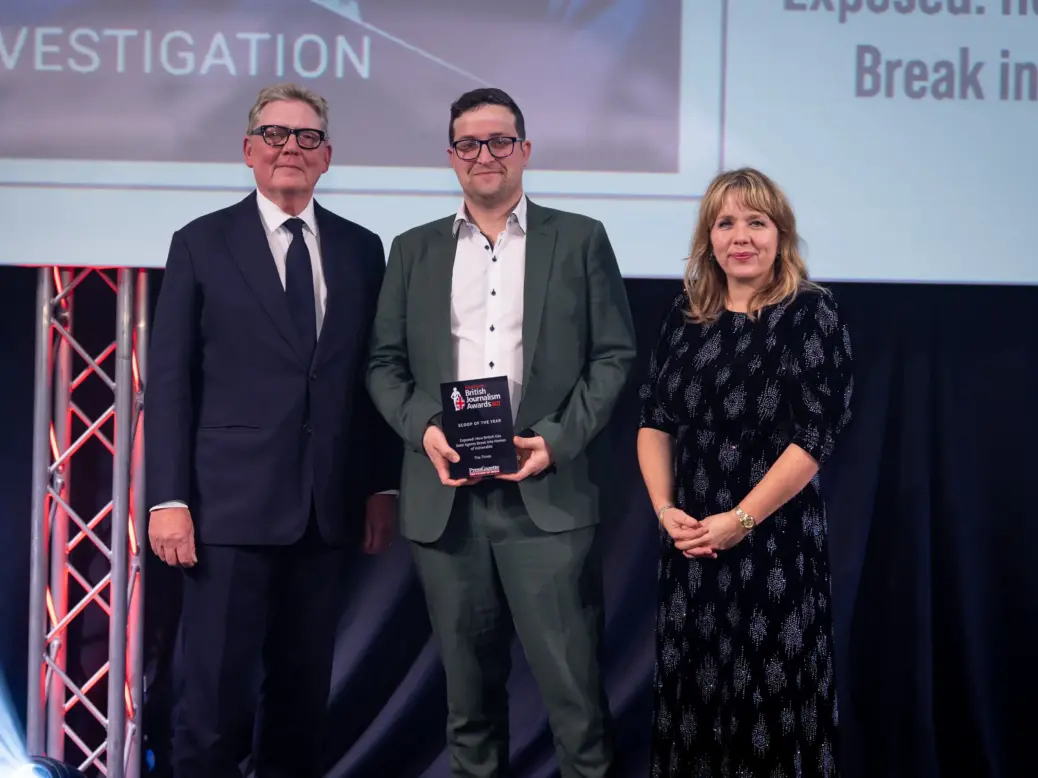
The award-winning Times investigation revealing British Gas was force-fitting pre-payment energy meters into the homes of the vulnerable had the “perfect grounds” for justifying undercover work.
Times head of investigations Paul Morgan-Bentley told Press Gazette why his editors and lawyers were persuaded that the expose was “genuinely in the public interest”.
Morgan-Bentley won Scoop of the Year at the British Journalism Awards in December for the investigation as well as the Online Video category at the Future of Media Awards in September for its “top-flight” packaging.
The investigation’s impact was immediate, with UK energy firms stopping the force-fitting of meters within hours of publication in February last year.
Conversations about potentially going undercover began in the early summer of 2022, Morgan-Bentley said, but he did not end up doing so until January 2023.
“People might assume that we can strap on cameras whenever we want and just try to catch people out but that’s just not the case. You go back and forth with senior editors and seeking legal advice. We get really pushed at the Times by our editors and lawyers about whether undercover work is necessary.
“This cannot be a fishing exercise – we can’t just strap a camera on to see what’s going on. We’ve got to consider why we think this is genuinely in the public interest and we really can’t find out this information in any other way.”
He said that in the case of the British Gas scandal, undercover work was the only possible way of collecting substantial evidence of wrongdoing.
Charities were warning about the force-fitting of pre-payment meters, voicing concerns over cases of vulnerable people being left in cold homes if they could not afford to top-up, he said.
“But there was always a disconnect between what the charities and families were saying and what the companies were insisting was true.”
He added: “These were the perfect grounds for undercover work because even if you found more people this had happened to, in each case, companies would say ‘this is a one off’.”
When asked where the idea to investigate this scandal came from, he said: “There are different ways investigations start and sometimes it’s because someone gets in touch but sometimes it’s just about thinking ahead and coming up with ideas – this one was the latter.”
Having previously investigated HMRC’s aggressive debt collection, he speculated on potential similar cases among energy companies.
Morgan-Bentley’s undercover work has included exposes of the Evri (then Hermes) delivery company and failings at Action Fraud, the police’s fraud reporting service, resulting in significant changes to the way fraudsters are policed.
He said: “In any other year, it’s controversial enough that energy firms have this unique power to get a warrant, break into people’s homes and change their meters, which can, very often, leave them living in cold homes.
“But particularly with the cost-of-living crisis, it felt extraordinary that they would continue doing this.”
His undercover work filmed employees forcing entry into vulnerable people’s homes to fit pay-as-you-go meters after payments had not been made.
This included entering the home of a single father with three children while they were out and, despite seeing a child’s inhaler, continuing to fit the meter.
When asked about the response he received after the scoop, he said: “It’s interesting when you go undercover because sometimes you can get abuse afterwards but sometimes you can also receive thanks.”
He cited a woman whose home he had entered as part of a team to fit a meter before his colleagues decided not to, identifying her as vulnerable as she had a newborn.
He later visited her to ask for permission to publish footage from the visit, which she not only agreed to, but thanked him for his work.
“She invited me in, she was so happy that we’d done it. She talked about, for instance, how her bills had increased by seven times, so she couldn’t afford the bills in the cost-of-living crisis.”
Morgan-Bentley added that some people who worked in the force-fitting agency thanked him for exposing what they were doing.
Asked if he had any advice for those interested in pursuing investigative work, Morgan-Bentley said: “The most important thing is accuracy and the thing that keeps me up at night is the idea of ruining my reputation by getting something badly wrong.”
He added: “I find some other types of journalism much more nerve-wracking because my shorthand isn’t as good as it used to be, and I worry about getting details down.
“That stresses me out much more than being undercover because when you’re undercover you can watch the footage back later and I find accuracy is easier to guarantee.”
Morgan-Bentley donated the money he earned while working undercover to charity.
Email pged@pressgazette.co.uk to point out mistakes, provide story tips or send in a letter for publication on our "Letters Page" blog
